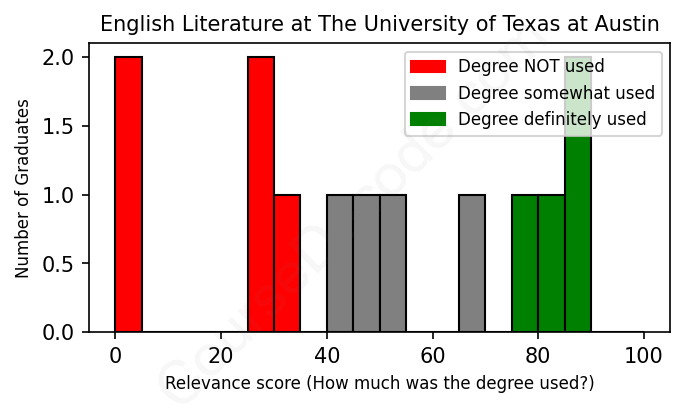
First, some facts. Of the English Literature graduates from The University of Texas at Austin we've analyzed , here's how many have used (or NOT used) their degree in their career:

These are estimates based on AI analysis of 13 LinkedIn profiles (see below).
The verdict? Significantly below average. Overall, with an average relevance score of 48%, English Literature graduates from The University of Texas at Austin have a much lower likelihood (-19%) of finding work in this field compared to the average graduate across all fields:
And for comparison, here's the chart for all profiles we've looked at across all degrees.
Also, after graduating, only 15% of these graduates have pursued further education other than another Bachelor's degree (such as a Masters degree or other), compared to the average across all profiles of 35%. This suggests a Bachelors degree is enough for most English Literature graduates, and it's normal to look for work straight after graduation.
See the details:
|
Relevance score: 76% We think this person has gone into a career highly relevant to their degree. We think this person has gone into a career highly relevant to their degree.
DEGREE INFOGraduated in 2017 from The University of Texas at Austin with a Bachelor of Arts - BA in English Literature. Also pursued further education since (see below). JOB HISTORY SINCE GRADUATIONNanny Private Company Jun 2018 - Aug 2018 Academic Coach  PACE Academic Coaching Aug 2018 - May 2020 Substitute Teacher  North East Indepent School District Sep 2020 - May 2021 Digital Marketing Copywriter  Private Political Marketing Firm Jun 2021 - Feb 2022 Content Writer  ButterflyMX Feb 2022 - Apr 2023 Content Manager  ButterflyMX Apr 2023 - Apr 2024 Director of Content  ButterflyMX Apr 2024 - Present FURTHER DEGREES DONE SINCE GRADUATINGMaster of Fine Arts - MFATexas State University 2017 - 2020 ABOUThttps://katharinekistler.wixsite.com/websiteCopy and technical writer with an M.F.A. in Creative Writing who enjoys figuring out the rhetoric that works for a targeted group of people and persuading them through powerful composition. I am skilled in copywriting, web content and feature writing, as well as event planning and small-scale social media marketing on Twitter and Instagram. |
The top 10 most common jobs done by the graduates we've analyzed (ranked most common to least) are:
When looking at the job paths of graduates from The University of Texas at Austin with degrees in English Literature, it seems like a mixed bag. A lot of the common roles revolve around things like management, teaching, and writing, but they usually don’t tie back directly to the core elements of English Literature. For example, many took on roles as restaurant managers or in other service-oriented positions, which don’t utilize the analytical skills associated with studying literature. Even in fields like business analysis or administrative roles, the link to literary studies is pretty weak, mostly brushing upon skills like critical thinking or communication rather than engaging with literary texts or critical theory. Overall, while some graduates found themselves in writing roles, which are definitely relevant, a good chunk has moved into jobs that don’t truly reflect the essence of an English Literature degree.
On the flip side, there are definitely graduates who carved out roles targeting more directly relevant fields, like teaching or writing-focused jobs. Teaching roles, in particular, are a fantastic application of their degree, allowing them to engage with literature daily. However, when you weigh the number of graduates in more general or unrelated roles against those in literature-centric careers, it looks like a lot of English majors might be navigating away from traditional literary professions. So, while there are some who’ve landed on paths that align closely with their studies, many have ventured into broader job markets where their skills are transferable but perhaps not fully utilized. This paints a reality for English Literature grads that is both promising in terms of versatility and challenging in terms of direct applicability to their field of study.
Here is a visual representation of the most common words in job titles for English Literature graduates (this is across all English Literature graduates we've analyzed, not just those who went to The University of Texas at Austin):

So, if you look closely at the career paths of folks who studied English Literature at the University of Texas at Austin, you’ll notice a bit of a mixed bag. Many of them jump into jobs that are pretty solidly related to writing and education right after graduation. For instance, some start off as teachers or editors, while others dive into technical writing or even restaurant management. It's clear they value strong communication skills, which is great, but that doesn't always mean they're landing roles that are directly aligned with their degree. A few years down the line, some have found their way into roles like content managers or directors, which is a good sign, but others seem to stray into areas that are less about literature, such as business analysis or administrative positions.
Looking at the trends five to ten years down the road, you'll see that there’s a group that has definitely carved out successful careers that leverage their English degree, particularly in fields like content creation, education, and public affairs. However, a notable number of graduates end up in roles that don’t directly make use of their literary training, like sales or administrative jobs. This indicates that while an English Literature degree can open some doors, it's not always a straight shot to a career in writing or editorial work. Ultimately, graduates have a range of options, but that also means they might need to be flexible and adaptable in a job market where direct relevance to their studies isn’t guaranteed.
Honestly, a Bachelor’s degree in English Literature, whether at The University of Texas at Austin or somewhere else, can be a bit of a mixed bag. You’re going to read a lot—like, a LOT—and some of those texts can be pretty dense and challenging to get through. It’s not necessarily "hard" in the way some science or math majors might be, but it definitely requires strong reading and writing skills, plus a good chunk of critical thinking. If you enjoy diving into different worlds through literature and can handle some deep analysis of those works, you’ll find it rewarding. Just be prepared for a hefty amount of papers and discussions; if you're up for that, it can be a great experience!
Most commonly, in the LinkedIn profiles we've looked at, it takes people 4 years to finish a Bachelor degree in English Literature.
Looking at the job paths of these English Literature grads from UT Austin, it seems like they had a mixed bag when it comes to earning potential. Some of them, especially those who ventured into teaching or non-profit roles, likely didn’t make a ton of cash, especially in the early years—think of the hourly server roles or teaching jobs. Meanwhile, others who jumped into business analysis or high-level positions in government or corporate sectors definitely seem to be pulling in decent salaries. Overall, while there are some who probably struggled a bit financially, there are also a few who might be making good money, especially those climbing the corporate ladder quickly. So, if you’re thinking about majoring in English, know it can lead to a variety of financial outcomes based on the path you pick!
Here is a visual representation of the most common words seen in the "about" section of LinkedIn profiles who have a Bachelor degree in English Literature (this is across all English Literature graduates we've analyzed, not just those who went to The University of Texas at Austin). This may or may not be useful:

Here are all colleges offering a Bachelor degree in English Literature (ordered by the average relevance score of their English Literature graduates, best to worst) where we have analyzed at least 10 of their graduates: